

Argumentative Essay On Democracy Is Better Than Military Rule
The debate between democracy and military rule has long been a topic of contention in discussions about governance. In this essay, we will explore the advantages of democracy over military rule, focusing on representation, human rights, the rule of law, economic development, and peaceful transitions of power. Democracy, with its emphasis on citizen participation and protection of individual rights, has proven to be a better path to progress and prosperity for nations worldwide.
Table of Contents
Reasons Why Democracy Is Better Than Military Rule Essay
Representation and participation.
One of the fundamental pillars of democracy is representation and participation. In democratic societies, citizens have the opportunity to elect their leaders, granting them a voice in shaping policies that impact their lives. Elected representatives, who are accountable to the people, advocate for the interests of their constituents and secure various perspectives, are considered in decision-making processes. In contrast, military rule often leaves citizens without a voice, as a select group makes decisions of military leaders without the consent of the governed.
Protection (adsbygoogle = window.adsbygoogle || []).push({}); of Human Rights
Democracies are characterized by a commitment to protecting individual rights and freedoms. Constitutional frameworks and independent judiciary systems in democratic nations ensure that basic human rights, such as freedom of speech, assembly, and expression, are upheld. These rights are essential for fostering an environment of open dialogue, debate, and progress. In contrast, military rule may impose restrictions on civil liberties, leading to censorship and oppression, stifling societal growth and development.
Rule of Law
The rule of law is a cornerstone of democratic governance. In a democracy, laws apply to all citizens equally, regardless of their social or political standing. This principle ensures that those in power are held accountable for their actions, promoting transparency and fairness. In military rule, the rule of law may be undermined, leading to arbitrary decision-making and a lack of checks and balances, which can result in abuse of power.
Economic Development
Empirical evidence suggests that democracies tend to experience higher levels of economic development compared to countries under military rule. The stability and predictability of democratic systems create a favorable environment for investment, innovation, and entrepreneurship. Additionally, democratic governments prioritize policies that foster economic growth, social welfare, and education, leading to better economic outcomes and improved living standards for citizens.
Peaceful Transitions of Power
One of the significant advantages of democracy is its ability to facilitate peaceful transitions of power through regular elections. In democratic nations, leaders are elected for a fixed term, and power is peacefully transferred to the winning candidate after each election cycle. This ensures political stability and reduces the risk of violent conflicts that can arise from power struggles in military regimes.
Challenges and Counterarguments
While democracy offers numerous benefits, it is essential to acknowledge its challenges and consider counterarguments. Democracies can face issues such as political polarization, bureaucratic inefficiencies, and the influence of money in politics. Furthermore, some argue that military rule can bring stability and decisive action in times of crisis. However, it is crucial to recognize that military rule often comes at the cost of human rights and undermines the principles of democratic governance.
In conclusion, democracy has proven to be a superior form of governance when compared to military rule. It ensures representation and citizen participation, protects human rights, upholds the rule of law, fosters economic development, and facilitates peaceful transitions of power. While it may face challenges, democracy remains the best path to progress and prosperity for nations worldwide. Embracing democracy’s core principles of inclusion, transparency, and accountability will continue to lead societies toward a brighter and more equitable future.

Hello! Welcome to my Blog StudyParagraphs.co. My name is Angelina. I am a college professor. I love reading writing for kids students. This blog is full with valuable knowledge for all class students. Thank you for reading my articles.
Related Posts:

Leave a Reply Cancel reply
Your email address will not be published. Required fields are marked *
Save my name, email, and website in this browser for the next time I comment.
Read our research on: Abortion | International Conflict | Election 2024
Regions & Countries
2. democracy widely supported, little backing for rule by strong leader or military.
Governance can take many forms: by elected representatives, through direct votes by citizens, by a strong leader, the military or those with particular expertise. Some form of democracy is the public’s preference.
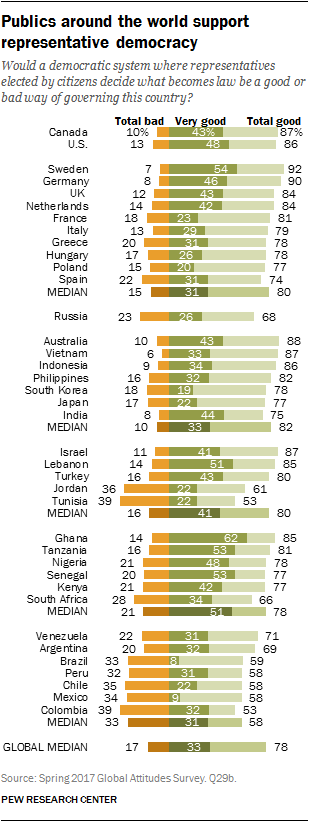
A global median of 78% back government by elected representatives. But the intensity of this support varies significantly between nations. Roughly six-in-ten Ghanaians (62%), 54% of Swedes and 53% of Senegalese and Tanzanians hold the view that representative democracy is very good. Just 8% of Brazilians and 9% of Mexicans agree. The only countries where there is significantly strong opposition to representative democracy are Colombia (24% say it is very bad) and Tunisia (23% very bad).
In many countries, skepticism of representative democracy is tied to negative views about economic conditions. In 19 countries, people who say their national economies are in bad shape are less likely to believe representative democracy is good for the country.
In 23 nations, the belief that representative democracy is good is less common among people who think life is worse today than it was 50 years ago. In Spain, for example, just 63% of those who believe life is worse than before consider representative democracy a good thing for their country, compared with 80% who support representative democracy among those who say life is better than it was a half century ago.
Similarly, pessimism about the next generation is related to negative views about representative democracy. In roughly half the nations surveyed those who think today’s children will be worse off financially than their parents are less likely than others to say representative democracy is a good form of government. Among Mexicans who believe the next generation will be worse off, only 52% say representative democracy is good for the country. Backing for government by elected representatives is at 72% among those who say children will be better off than their parents.
Attitudes toward representative democracy are also associated with opinions about diversity. In more than a third of the nations surveyed those who think that having people of many different backgrounds – such as different ethnic groups, religions and races – makes their country a worse place to live are less likely than others to support government by elected representatives. In South Africa, a country with a troubled history of racial oppression and conflict, 73% of those who embrace diversity describe representative democracy as a good thing for their country; just 54% agree among those who say diversity makes South Africa a worse place to live.
Many publics want a direct say
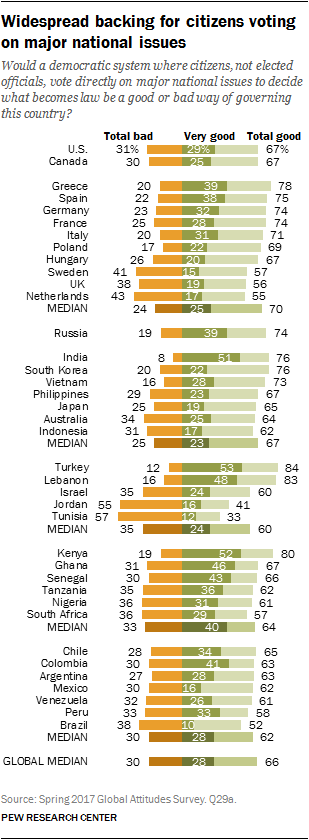
Direct democracy, a governing system where citizens, not elected officials, vote directly on major national issues, is supported by roughly two-thirds of the public around the world, with little difference in views between regions.
The strongest support for governing through referenda is found in Turkey (84%), where 53% of the public say it would be very good to have citizens vote on major national issues. Lebanon (83%) and Kenya (80%) also show broad support for direct democracy.
There is also strong backing for such governance in Japan (65%) even though the country has not had a referendum in the post-World War II era.
In the U.S., Germany and the Netherlands, people with a high school education or less are more likely than those with more than a high school education to support direct democracy. Such differences are small in the U.S. (6 percentage points) and Germany (8 points) but there is a 17-point differential in the Netherlands (62% of those with less educational attainment back direct democracy, but only 45% of those with more education agree).
In six of seven Latin American nations surveyed, those with a secondary school education or above are more supportive of direct democracy than those with less than a high school education. This educational divide is 16 points in Chile and 14 points in Argentina and Colombia. In each of these countries, those with less education are less likely to hold an opinion of direct democracy.
In Latin America, there is also a generation gap in views of direct democracy. In Brazil, Chile, Mexico and Venezuela, those ages 18 to 29 are more supportive than those ages 50 and older of having citizens, not elected officials, vote directly on issues of major national importance.
Notably, in the U.S. it is people ages 30 to 49 who are most likely (73%) to back referenda.
In other countries there are sharp divisions along religious or ethnic lines. In Israel it is Arabs (83%) more than Jews (54%) who favor direct democracy, and in Nigeria it is Muslims (70%) more than Christians (55%).
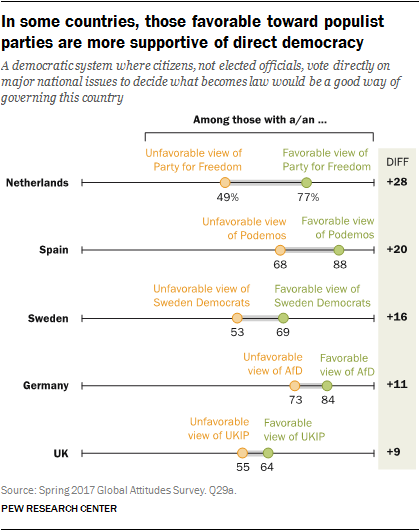
Support for direct democracy can also be seen in other recent Pew Research Center findings in Europe. In the wake of the United Kingdom’s decision to leave the European Union, a median of just 18% in nine continental EU member states say they want their country to exit the EU. But 53% support holding a national vote on their own country’s EU membership.
And such support is particularly strong among backers of Euroskeptic populist parties, many of whom have promised their supporters a referendum on EU membership. (For more on European’s attitudes about staying in the EU, see Post-Brexit, Europeans More Favorable Toward EU .)
And in six of the nine continental European nations surveyed, strong majorities of those who believe that direct democracy is a very good form of governance support their own EU membership referendum.
Technocracy has its champions
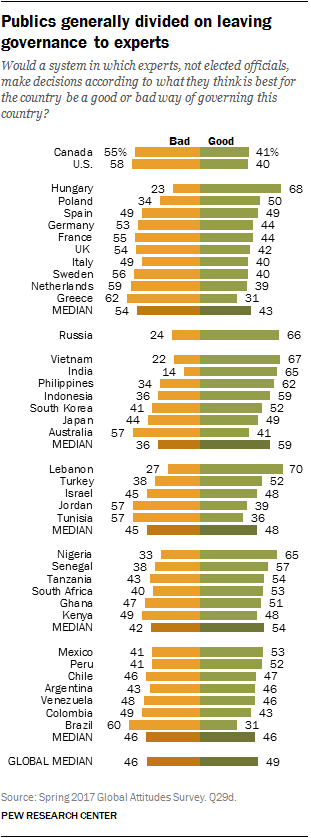
The value of expert opinion has been questioned in the eyes of the public in recent years. But when asked whether a governing system in which experts, not elected officials, make decisions would be a good or bad approach, publics around the world are divided: 49% say that would be a good idea, 46% think it would be a bad thing.
Europeans (a median of 43%) and Americans (40%) are the least supportive. But among Europeans, roughly two-thirds of Hungarians (68%) say leaving decision-making to experts would be a good way to govern.
Asian-Pacific publics generally back rule by experts, particularly people in Vietnam (67%), India (65%) and the Philippines (62%). Only Australians are notably wary: 57% say it would be a bad way to govern, and only 41% support governance by experts.
More than half of Africans surveyed also say governing by experts would be a good thing for their country. Nigerians (65%) are especially supportive. And it is Nigerian Muslims more than Christians who say this.
Young people in a number of advanced economies are particularly attracted to technocracy. In the U.S. the age gap is 10 percentage points – 46% of those ages 18 to 29 but only 36% of those ages 50 and older say it would be good if experts, not elected officials, made decisions. The young-old differential is even greater in Australia (19 points), Japan (18 points), the UK (14 points), Sweden (13 points) and Canada (13 points).
Some support for rule by strong leader
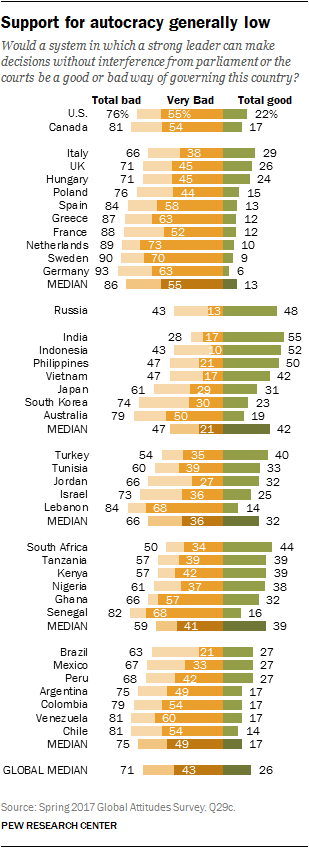
Rule by a strong leader is generally unpopular, though minorities of a substantial size back it. A global median of 26% say a system in which a strong leader can make decisions without interference from parliament or the courts would be a good way of governing. Roughly seven-in-ten (71%) say it would be a bad type of governance.
Opposition is particularly widespread in Europe (a median of 86% oppose rule by a strong leader), with strong opposition in Germany (93%), Sweden (90%) and the Netherlands (89%).
But autocracy is not universally opposed. Roughly four-in-ten Italians (43%) who have a favorable view of Forza Italia, the political party founded by former Italian Prime Minister Silvio Berlusconi, and a similar share of the British (42%) who favor UKIP say a strong leader making decisions would be good for their country. Nearly half of Russians (48%) back governance by a strong leader.
In Asia, 55% of Indians, 52% of Indonesians and 50% of Filipinos favor autocracy. Such support is particularly intense in India, where 27% very strongly back a strong leader.
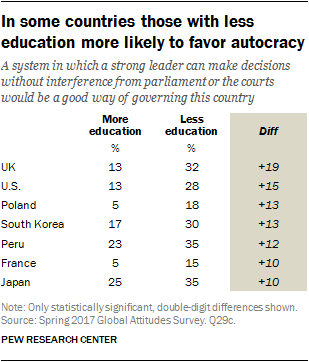
Public views of rule by a strong leader are relevant in countries that have experienced degrees of authoritarianism in recent years. Roughly eight-in-ten Venezuelans (81%) and 71% of Hungarians oppose a strong leader who makes decisions without interference of parliament or the courts.
Rule by a strong leader also appeals to older members of the public in some countries. More than a quarter of Hungarians (29%) and South Koreans (34%) ages 50 and older favor governance by a strong leader.
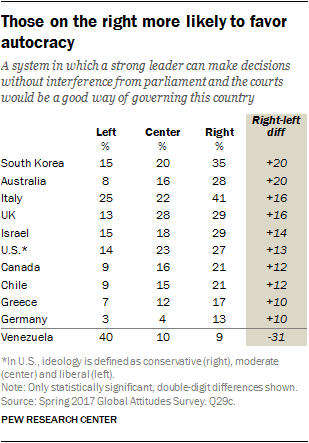
In advanced economies there is little overall backing for autocracy. But, where such support does exist, it is often people with a secondary education or below who are more likely than those with more education to favor autocratic rule. This educational divide is particularly wide in the UK (19 percentage points), the U.S. (15 points), Poland and South Korea (both 13 points).
In a number of nations there is a significant division of opinion about strong leaders based on ideology. Those who place themselves on the right of the ideological spectrum are more likely than those who place themselves on the left to say a strong leader making decisions would be a good way of governing. The ideological gap is 20 percentage points in South Korea and Australia and 16 points in Italy and the UK. Notably, in Venezuela, which has been ruled by populist, left-wing strongmen, those on the left are more supportive of autocratic rule than those on the right.
Significant minorities support military rule
There is minority support for a governing system in which the military rules the country: a median of 24% in the 38 nations surveyed. At least four-in-ten Africans (46%) and Asians (41%) see value in a government run by the generals and admirals.
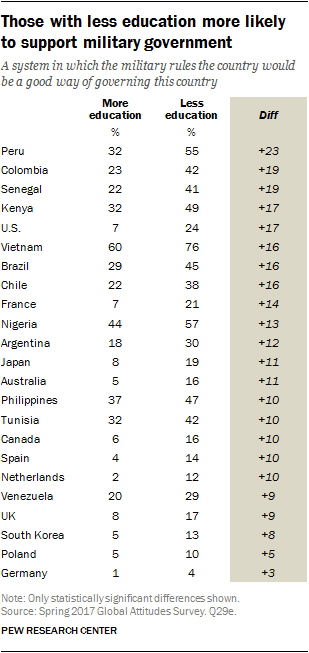
Notably, roughly half of both Indians (53%) and South Africans (52%), who live in nations that often hold themselves up as democratic exemplars for their regions, say military rule would be a good thing for their countries. But in these societies, older people (those ages 50 and older) are the least supportive of the army running the country, and they are the ones who either personally experienced the struggle to establish democratic rule or are the immediate descendants of those democratic pioneers. In South Africa, blacks (55%) more than whites (38%) also favor the military making governance decisions.
Only one-in-ten Europeans back military rule. But some on the populist right of the political spectrum voice such support. Nearly a third of those who hold a favorable view of the National Front in France (31%) say a governing system in which the military rules the country would be a good thing, as do nearly a quarter of those who favor UKIP in the United Kingdom (23%).
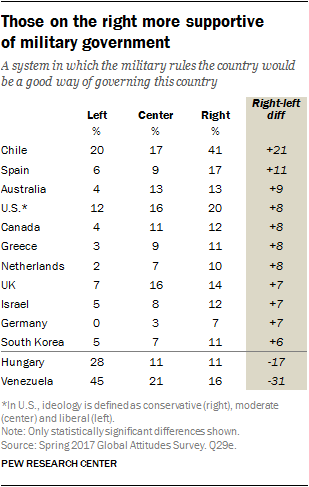
Support for a governing system in which the military rules the country enjoys backing among people with less education in at least half the countries surveyed, with some of the strongest support among those with less than a secondary education in Africa and Latin America.
More than half of Peruvians with less than a high school education (55%) prefer military rule. Only about a third (32%) of more educated Peruvians agree.
Particularly strong backing for military rule also exists among the less educated in Vietnam (76%), Nigeria (57%), Kenya (49%) and the Philippines (47%).
Notably, one-in-five of those ages 50 and older in the U.S. support military rule, as do roughly one-in-four Japanese (24%) ages 18 to 29.
Ideology also plays a role in public views of military rule. But it can cut both ways. In some countries, people on the right of the political spectrum are significantly more supportive of military governance than those on the left, especially in Chile. In Hungary and Venezuela, on the other hand, it is more likely to be individuals on the left who see value in military rule.
Add Pew Research Center to your Alexa
Say “Alexa, enable the Pew Research Center flash briefing”
Report Materials

Table of Contents
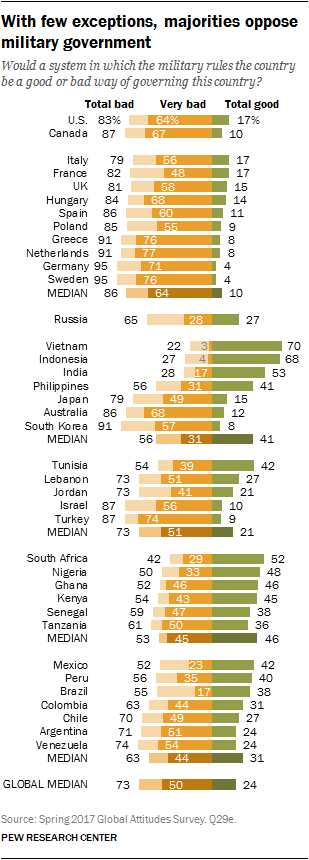
Freedom, Elections, Voice: How People in Australia and the UK Define Democracy
Global public opinion in an era of democratic anxiety, most people in advanced economies think their own government respects personal freedoms, more people globally see racial, ethnic discrimination as a serious problem in the u.s. than in their own society, citizens in advanced economies want significant changes to their political systems, most popular.
About Pew Research Center Pew Research Center is a nonpartisan fact tank that informs the public about the issues, attitudes and trends shaping the world. It conducts public opinion polling, demographic research, media content analysis and other empirical social science research. Pew Research Center does not take policy positions. It is a subsidiary of The Pew Charitable Trusts .

DEBATE TOPIC: 10 Reasons Why Civilian Rule is Better than Military Rule ( Support and oppose the motion)
Table of Contents
write an argumentative essay on civilian rule is better than military rule
Explore the debate on whether civilian rule is better than military rule . This article provides insights into the advantages of civilian governance, backed by expert opinions and historical examples.
Civilian rule and military rule are two contrasting forms of governance that have shaped the course of history and politics. The debate surrounding the effectiveness and suitability of these forms of rule has been ongoing for decades. In this article, we delve into the reasons why civilian rule is considered superior to military rule.
FREE DOWNLOAD NOW
By examining key aspects, historical instances, and expert opinions, we aim to shed light on the strengths of civilian governance and why it is a preferred choice for societies striving for stability, development, and freedom.
Debate on civilian rule is better than military rule
10 reasons why civilian rule is better than military rule
Civilian rule is a fundamental aspect of democratic governance, and it has several advantages over military rule. Here are 10 reasons why civilian rule is better than military rule:
- Accountability : Civilian rule ensures that elected officials are accountable to the people, as they are chosen through free and fair elections. This accountability mechanism is absent in military rule, where the military leadership is not directly accountable to the public
- Civilian control of the military : Civilian rule allows for the establishment of a clear chain of command, with civilians in control of the military. This ensures that the military is subordinate to the larger purposes of the nation, rather than the other way around
- Protection of human rights : Civilian rule is more likely to protect human rights and uphold the rule of law, as it is based on democratic principles and the protection of individual freedoms
- Economic development : Civilian rule is more conducive to economic development, as it fosters a stable political environment and encourages investment and growth
- Peaceful transfer of power : Civilian rule allows for a peaceful transfer of power through elections, ensuring that political change occurs through democratic means rather than through force or violence
- Respect for international law : Civilian rule is more likely to respect international law and cooperate with other nations, as it is based on diplomacy and cooperation rather than force and coercion
- Promotion of democracy : Civilian rule promotes the spread of democracy and democratic values, as it demonstrates the benefits of democratic governance and encourages other nations to adopt similar systems
- Protection of minority rights : Civilian rule is more likely to protect the rights of minority groups, as it is based on the protection of individual freedoms and the promotion of diversity
- Reduction of corruption : Civilian rule is more likely to reduce corruption, as it promotes transparency and accountability in government
- Promotion of peace and stability : Civilian rule is more likely to promote peace and stability, as it fosters a stable political environment and encourages dialogue and compromise rather than force and coercion.
- JAMB Regularization for NYSC Registration & Mobilization 2024 Batch A, B and C PCMs
- How To Contact JAMB For Complaints, Inquiries and Other issues
DEBATE TOPIC: Civilian Rule is Better than Military Rule
Civilian rule refers to a government led by individuals who are not affiliated with the military. It is characterized by a focus on democracy, human rights, and the rule of law. Military rule, on the other hand, involves the direct control of a nation by the armed forces. While both forms of governance have been prevalent in various parts of the world, there are compelling reasons why civilian rule is widely regarded as the superior option.
Advantages of Civilian Rule
Democratic principles and representation.
Civilian rule inherently promotes democratic principles, ensuring that the government is accountable to the people it governs. Elected officials represent the interests of the citizens, creating a system where policies and decisions are made with the welfare of the populace in mind. This democratic process encourages transparency, participation, and a sense of ownership among citizens.
Protection of Human Rights
Under civilian rule, the protection of human rights is a fundamental priority. Constitutions and legal frameworks are designed to safeguard individual freedoms and prevent abuse of power. This commitment to human rights fosters an environment of equality and justice, allowing citizens to live without fear of oppression.
Sustainable Socioeconomic Development
Civilian governments are often better equipped to focus on long-term socioeconomic development. Policies can be formulated and executed based on comprehensive assessments of the nation’s needs and resources. Moreover, civilian rule promotes a stable environment that attracts foreign investments, encourages innovation, and supports economic growth.
Peaceful Conflict Resolution
Civilian governments emphasize diplomacy and negotiation in resolving conflicts, both domestically and internationally. Open dialogue and peaceful negotiations are preferred methods for resolving disputes, reducing the likelihood of armed conflicts that can arise under military rule.
Strengthening International Relations
Civilian rule tends to foster better diplomatic relations with other countries. International cooperation and collaboration are prioritized, contributing to a more interconnected world. Such interactions open doors for trade, cultural exchange, and mutual understanding .
- APPLY: Farleigh Dickinson University, USA degree scholarship, 2024 (Up to $24,000 every year)
Historical Examples of Successful Civilian Rule
The united states: a beacon of democracy.
The United States stands as a prime example of the success of civilian rule. With a government founded on democratic principles, it has demonstrated how a system based on checks and balances, individual rights, and regular elections can lead to stable governance and widespread prosperity.
South Korea: A Transition to Democracy
South Korea’s transition from military rule to civilian rule marked a turning point in its history. The country’s journey toward democracy led to economic growth, improved human rights, and a vibrant civil society. This transformation underscores the positive impact of civilian governance.
- APPLY: NNPC/SNEPCo University Undergraduate degree Scholarship
India: Diversity and Democracy
India, with its diverse population and complex social fabric, has embraced civilian rule since its independence. Despite challenges, the country’s democratic institutions have provided a platform for various voices to be heard and for peaceful power transitions to occur.
Expert Opinions on Civilian Rule
Renowned political scholars and experts overwhelmingly advocate for civilian rule as the preferred form of governance. Dr. Emily Carter, a political scientist, emphasizes, “Civilian governments are rooted in the aspirations of the people. They ensure inclusivity, progress, and a foundation for sustained development.”
- YABATECH Change of Course Form 2024: How To do It?

FAQs (Civilian Rule is Better than Military Rule )
Q: Can military rule bring stability in times of crisis? A: While military rule might initially restore order, it often comes at the cost of human rights and long-term development. Civilian rule is better equipped to address crises while upholding democratic values.
Q: Are there instances where military rule led to positive outcomes? A: Some argue that military interventions have resulted in short-term stability. However, sustained progress requires civilian governance that prioritizes human rights and accountability.
Q: How does civilian rule prevent abuse of power? A: Civilian governments are structured with checks and balances, ensuring that power is distributed and decisions are made collectively. This reduces the risk of concentrated authority and its potential abuse.
Q: What role does civilian rule play in economic growth? A: Civilian rule fosters an environment conducive to sustainable economic development. Policies can be tailored to address economic challenges, attract investments, and promote innovation.
Q: Can military rule effectively handle diplomatic relations? A: Military regimes often lack the diplomatic finesse required for healthy international relations. Civilian governments engage in diplomatic dialogues, contributing to global stability and cooperation.
Q: Are there risks associated with civilian rule? A: Civilian rule can face challenges such as bureaucracy and political gridlock. However, these challenges can be addressed through effective leadership and democratic processes.
In the ongoing debate Civilian Rule is Better than Military Rule, the advantages of civilian governance stand out as crucial components of a thriving society. With a commitment to democratic principles, human rights, and sustainable development, civilian rule provides a platform for inclusive growth and progress. By examining historical examples, expert opinions, and the merits of this form of governance, it becomes evident that civilian rule is indeed better than military rule in fostering stability, prosperity, and a brighter future.
1 thought on “DEBATE TOPIC: 10 Reasons Why Civilian Rule is Better than Military Rule ( Support and oppose the motion)”
Leave a comment cancel reply.
Save my name, email, and website in this browser for the next time I comment.
Democracy Arguments For and Against Essay
Introduction, arguments for democracy, arguments against democracy, works cited.
Contrary to other ideas in political science such as justice and liberty, democracy is a term that can be easily explained. It mainly relates to the government by the majority. Although characterizing democracy is not difficult, the latest political theory is often left this out. No strong argument is provided by political theorists regarding the reason for representative democracy.
On the other hand, if any is given, it lacks strength. One would anticipate that great literature can be created from the reasons for the promotion and institution of democracy. On the contrary, popular literature does not delve so much into why democracy is desirable, but instead, get to explain the reasons for the improvement of the current democracy. This essay examines what different philosophers have had to argue both for and against democracy.
One of the arguments is that democracy is important because it can be embraced and made deliberative. This implies that deliberation of a dialogical nature is vital to the democratic society. When democracy is made deliberate in a given society, instead of people’s mere adaptation to circumstance, their preferences are not only informed but also made clear.
Democracy also helps to remove points of difference among people without necessarily making them agree. At times, democracy requires that people be compelled to embrace a general perspective. As such, both their imagination and empathy are stretched. In the same vein of the deliberateness of democracy, selfish concerns can be separated from public-oriented considerations thus encouraging public reasoning for participants who are free and equal (Sosa & Villanueva 287-288).
Research also indicates that making democratic to be more deliberative is likely to result to other benefits such as legitimizing all decisions that are arrived at, encouraging the powerless to voice their concerns in decision making, promoting transparency among group members and enhancing outcomes that are just.
Another argument that favors the importance of democracy in deliberation is one that aims at making deliberation democratic and not vice versa. This implies that whenever there is democratic deliberation, then the probability of reaching the truth based on reliability increases with the presence of a democratic decision-making regime.
Moreover, democracy enhances the proper allocation of resources to appropriate uses. This argument is supported by the fact dictatorial leaders are not fully accountable to citizens and do not have motivations to put the total output into maximum use. Instead, they focus on their selfish ends.
Consequently, democracy ensures that property rights are protected hence allowing investors to have a long term perspective. Besides, allowing free flow of information ensures that the quality of economic decisions made is high (Dahl 448).
In attempting to argue against democracy, Gordon takes on several philosophers who have argued in favor of democracy. He does this by revealing how such arguments fail to hold water when based on democracy because, in his perspective, the proponents of democracy do not express the desirability of democracy as it were. A good example of writers who have omitted this fact is Bernard Barber.
He dismisses other philosophers on this matter arguing that a just political order can only be reached at through a discussion and not by avoiding it. Questions of distributive justice can properly be dealt with by individuals rather than by philosophers alone since it would be undemocratic to do the reverse. However, Barber does not clearly explain why people should value democracy.
His concern is that individuals thinking on their own can reach wiser decisions than a group of individuals discussing the same issue. He’s satisfied with the fact that Rousseau concurs with the issue. If he were to be correct about this empirical matter, then it would be sound to conclude that if democratic governance would guide a society, then it would be prudent to arrive at decisions in such a society through discussions.
Although this point is still devoid of the desirability of democracy, it centers on the importance of democracy in discussing policy publicly. Deliberating on issues publicly is not a compulsory ingredient for democracy. For instance, during the nineteenth century, there was no democracy in the British government although public issues could be discussed broadly (Gordon para.5).
Plato presents a couple of arguments against democracy. First, Plato describes democracies as societies that are anarchic. He believes that societies that are democratic are marked with anarchy. For example, his attack describes governments that are democratic for being libertarian in such a manner every citizen can carry out their life issues in a way that appeals to them.
In this way, he asserts that people mistake anarchy for freedom. Plato criticizes democratic societies again by asserting that since they are characterized with anarchy, they are devoid of unity. They are not united on two fronts. First, due to the lack of political structure and are not politically organized. Second, democratic societies do not have a leadership structure since everyone can speak on political issues.
Second, Plato argues that democratic societies are likely to adhere to what their citizens want hence lacking any concern for the good of all. If anarchy is what features in democracies, then every individual has the freedom to choose what will ultimately benefit him or her. These choices may clash and encourage people to value their own needs rather those of others as well.
This is a clear pursuit of personal desires which may encourage loss of the common good. Since citizens have no idea of what ruling is, it happens that they pursue their passions and not the reason because reason cannot be applied in such pursuits. Any leaders that are elected through democracy are therefore servants who are out to satisfy the individual desires and appetites of the citizens.
Plato further argues that citizens who are guided by democracy are likened to individuals who grope in darkness since they do not have what it takes to execute governance (Kofmel 20). Moreover, Plato lists two more difficulties. First, numerous individuals falsely believe that they have adequate political proficiency that can qualify them to take part in political issues.
Citizens are not bothered by the fact that on account of their political standing, they are entitled to an equal political voice with each other. Second, when people get involved in a philosophical investigation with each other, they are more concerned with winning arguments instead of the following truth.
Therefore, even though citizens may be endowed with enough political expertise, it may be concluded that they will not be able to manage it effectively (Kofmel 21). The best remedy to this problem is to limit popular involvement in politics and allowing those who have sufficient political know-how in matters of governance to take the lead in the political decision-making process. Such are the people who can guide the citizens into achieving their common good.
Democracy is a term that is perceived differently by different people. Arguments put forth in favor of it are that it encourages fair allocation of resources, sound decision making especially by the powerless and allows for transparency and justice through deliberation.
Arguments against democracy are that it is not the best option for decision making, it encourages anarchy and hence lack of unity and that democracy encourages people who do not have sufficient political expertise to be involved in decision making. This results in a lack of common good.
Dahl, Robert. The Democracy Sourcebook. NY: MIT Press, 2003. June 19, 2011.
Gordon, David. What’s the Argument for Democracy? LeRockwell.com, 1992. June 19, 2011.
Kofmel, Erich. Anti-Democratic Thought. Exeter, UK: Imprint Academic, 2008. June 19, 2011.
Sosa, Ernest & Villanueva, Enrique. Social, Political and Legal Philosophy, Volume 1. Malden, USA: Blackwell Publishers, 2001. June 19, 2011.
- Chicago (A-D)
- Chicago (N-B)
IvyPanda. (2020, March 14). Democracy Arguments For and Against. https://ivypanda.com/essays/democracy-arguments-for-and-against/
"Democracy Arguments For and Against." IvyPanda , 14 Mar. 2020, ivypanda.com/essays/democracy-arguments-for-and-against/.
IvyPanda . (2020) 'Democracy Arguments For and Against'. 14 March.
IvyPanda . 2020. "Democracy Arguments For and Against." March 14, 2020. https://ivypanda.com/essays/democracy-arguments-for-and-against/.
1. IvyPanda . "Democracy Arguments For and Against." March 14, 2020. https://ivypanda.com/essays/democracy-arguments-for-and-against/.
Bibliography
IvyPanda . "Democracy Arguments For and Against." March 14, 2020. https://ivypanda.com/essays/democracy-arguments-for-and-against/.
- A Critique on Deliberative Democracy
- Deliberative Dialogue and Its Distinctions From Debate
- Deliberative Democracy Case Studies
- Politics: "Jihad Versus McWorld" by Benjamin Barber
- Biographical Profile of Jamaal Barber
- Deliberative Dialogues: Community Communication
- Desirability for Control in the Workplace
- Deliberative Democracy as an Improvement of Democratic Participation
- “The Barber of Buenos Aires”: Finance Case of Argentina
- Social Desirability Bias in Post-Graduate Students
- Ideology and Ideological State Apparatuses
- Analysis of Hugo Chavez and Muamar Gaddafi's Reign Through Machiavelli's Eye
- Machiavelli’s Views on Democratization and Their Relation to Modern Politics
- "The Corporation" by Joel Bakan
- The Effects of the American Correctional Policy
Privacy Overview
Necessary cookies are absolutely essential for the website to function properly. This category only includes cookies that ensures basic functionalities and security features of the website. These cookies do not store any personal information.
Any cookies that may not be particularly necessary for the website to function and is used specifically to collect user personal data via analytics, ads, other embedded contents are termed as non-necessary cookies. It is mandatory to procure user consent prior to running these cookies on your website.
Is Military Rule Better Than The Civilian Rule Or Vice-Versa?
This article examines whether military rule is better than the civilian rule and vice-versa. It provides the advantages of each system of government and gives room for readers to build on any of the points highlighted.
What is a Democratic Government?
Democracy is a form of government in which all eligible citizens have an equal say in the decisions that affect their lives. Democracy allows people to participate equally—either directly or through elected representatives—in the laws’ proposal, development, and creation. i.e., A democratic government is ruled by civilians, usually elected by the people. Democracy is ruled by the constitution and reign of civil laws, which are reasonably justifiable in a democratic society with civilians exercising all legislative, executive, and judicial powers.
A democratic government contrasts two forms of government where power is either held by one, as in a monarchy or where power is held by a small number of individuals, as in an oligarchy or aristocracy. Nevertheless, these oppositions, inherited from Greek philosophy, are now ambiguous because contemporary governments have mixed democratic, oligarchic, and monarchic elements. Several variants of democracy exist, but there are two primary forms that concern how the whole body of citizens executes its will: direct democracy and representative democracy.
Read: Is democracy the best form of government?
What is a Military Government
A military government is ruled by the armed forces, who do not come to power through election, but by force of arms. A military regime is a process, procedure, or system with expertise, adapted and rooted in war and combat. It is a system rooted in martial law and forces. It is also a system that demands obedience always and, in its purest essence, makes no room for debate and opposition.
Some of the features of military rule include Suspension of the constitution, absence of an election, use of decrees and edicts, lack of respect for fundamental human rights, no checks and balances, centralized form of government, no periodic election, etc.
Read: Causes and remedies to indiscipline in schools
Is military rule better than the civilian rule?
Below are the advantages of civilian rule and military rule. This will help you give the essential points to defend the side you want to take, i.e., Military rule is better than a civilian rule, or civilian rule is better than military rule.
Civilian Rule
- There are ways to resolve different views and conflicts peacefully.
- It is a government by the people and for the people
- Respect for human dignity.
- The freedom to act, speak and think freely (as long as it does not stop others from doing the same).
- Equality before the law.
- Safe and secure community.
- It is a system of government that is efficient, transparent, responsive, and accountable to citizens.
- Ability to hold elected representatives accountable.
- Opposition and criticism are tolerated.
Military Rule
- The military has protocol and structure.
- Protection of life and properties is ensured in a military regime.
- Decision-making is faster in military regimes than in civilian.
- It instills discipline and brings about order and corporate living among people in society.
- Control of corruption
- It is cost-effective. Since the election is not conducted, billions spent on this process are avoided.
- There is respect of authority
- Criminal activities are minimal. Martial law can quickly illuminate all criminals.
Military naturally commands respect and fear that is enough to make everyone do what is right while the nation develops with people marginalizing one another.
Related posts:
- Nigerian Military School JS1 Application Form 2024/2025
- Nigerian Military School (NMS) Admission List 2023/2024
- Nigerian Military School (NMS) Zaria School Fees 2023/2024
- Effective teaching as a tool for national development
- IELTS fees, Location, Test dates, And Exam Tips In Nigeria
Bolarinwa Olajire
Democracy Essay for Students and Children
500+ words essay on democracy.
Democracy is known as the finest form of government. Why so? Because in a democracy, the people of the country choose their government. They enjoy certain rights which are very essential for any human being to live freely and happily. There are various democratic countries in the world , but India is the largest one. Democracy has withstood the test of time, and while other forms have the government has failed, democracy stood strong. It has time and again proved its importance and impact.

Significance of a Democracy
Democracy is very important for human development . When people have free will to live freely, they will be happier. Moreover, we have seen how other forms of government have turned out to be. Citizens are not that happy and prosperous in a monarchy or anarchy.
Furthermore, democracy lets people have equal rights. This ensures that equality prevails all over the country. Subsequently, it also gives them duties. These duties make them better citizens and are also important for their overall development.
Most importantly, in a democracy, the people form the government. So, this selection of the government by the citizens gives everyone a chance to work for their country. It allows the law to prevail efficiently as the rules are made by people whom they have selected.
In addition, democracy allows people of various religions and cultures to exist peacefully. It makes them live in harmony with one another. People of democracy are more tolerant and accepting of each other’s differences. This is very important for any country to be happy and prosper.
Get the huge list of more than 500 Essay Topics and Ideas
India: A Democratic Country
India is known to be the largest democracy all over the world. After the rule of the British ended in 1947 , India adopted democracy. In India, all the citizens who are above the age of 18 get the right to vote. It does not discriminate on the basis of caste, creed, gender, color, or more.

Although India is the largest democracy it still has a long way to go. The country faces a lot of problems which do not let it efficiently function as a democracy. The caste system is still prevalent which hampers with the socialist principle of democracy. Moreover, communalism is also on the rise. This interferes with the secular aspect of the country. All these differences need to be set aside to ensure the happiness and prosperity of the citizens.
In short, democracy in India is still better than that in most of the countries. Nonetheless, there is a lot of room for improvement which we must focus on. The government must implement stringent laws to ensure no discrimination takes place. In addition, awareness programs must be held to make citizens aware of their rights and duties.
Customize your course in 30 seconds
Which class are you in.

- Travelling Essay
- Picnic Essay
- Our Country Essay
- My Parents Essay
- Essay on Favourite Personality
- Essay on Memorable Day of My Life
- Essay on Knowledge is Power
- Essay on Gurpurab
- Essay on My Favourite Season
- Essay on Types of Sports
Leave a Reply Cancel reply
Your email address will not be published. Required fields are marked *
Download the App

Global site navigation
- Celebrities
- Celebrity biographies
- Messages - Wishes - Quotes
- TV-shows and movies
- Fashion and style
- Capital Market
- Family and Relationships
Local editions
- Legit Nigeria News
- Legit Hausa News
- Legit Spanish News
- Legit French News
Advantages of democracy over military rule in Nigeria
Eventually, people will always talk about the advantages of democracy over military rule in Nigeria. Those who had an opportunity to compare two rules will vote for democracy and will always appreciate peaceful and stable democracy. We will remind you in this article one more time why the whole country has to work hard to overcome the challenges of Democracy in Nigeria.

What is democracy
Today democracy is considered the best form of government in the world. In a democratic state, people are believed to have power in there hands, and people decide how to rule the country.
The characteristics of democracy are:
- People are the highest form of political power; they have a right to choose and to be chosen.
- Mass media and citizens have a right to express themselves; people can even organize meetings.
- The law protects the rights of the citizens.
- The rule of law prevails.
- The separation of powers into executive, legislature and judicial branches.
- Pure democracy does not exist.

Top 5 causes of the current religious crisis in Nigeria and possible solutions
READ ALSO: What are main features of democracy?
You must be surprised by the last line, but this is indeed the problem of democracy, it does not exist. There are always exceptions that do not permit people to rule the country entirely. At the same time, these restrictions do not let the democracy to become the anarchy. Anyway, to see all advantages of the regime that is supposed to be called “democracy,” we will compare it with the other governing experienced by the Nigerians – military rule.
What is military rule
Military rule - is political regime when the power is concentrated in the hands of the military as an organization. It is believed to be one of the types of the authoritarian regime because at the time of military rule human rights are noticeably limited.
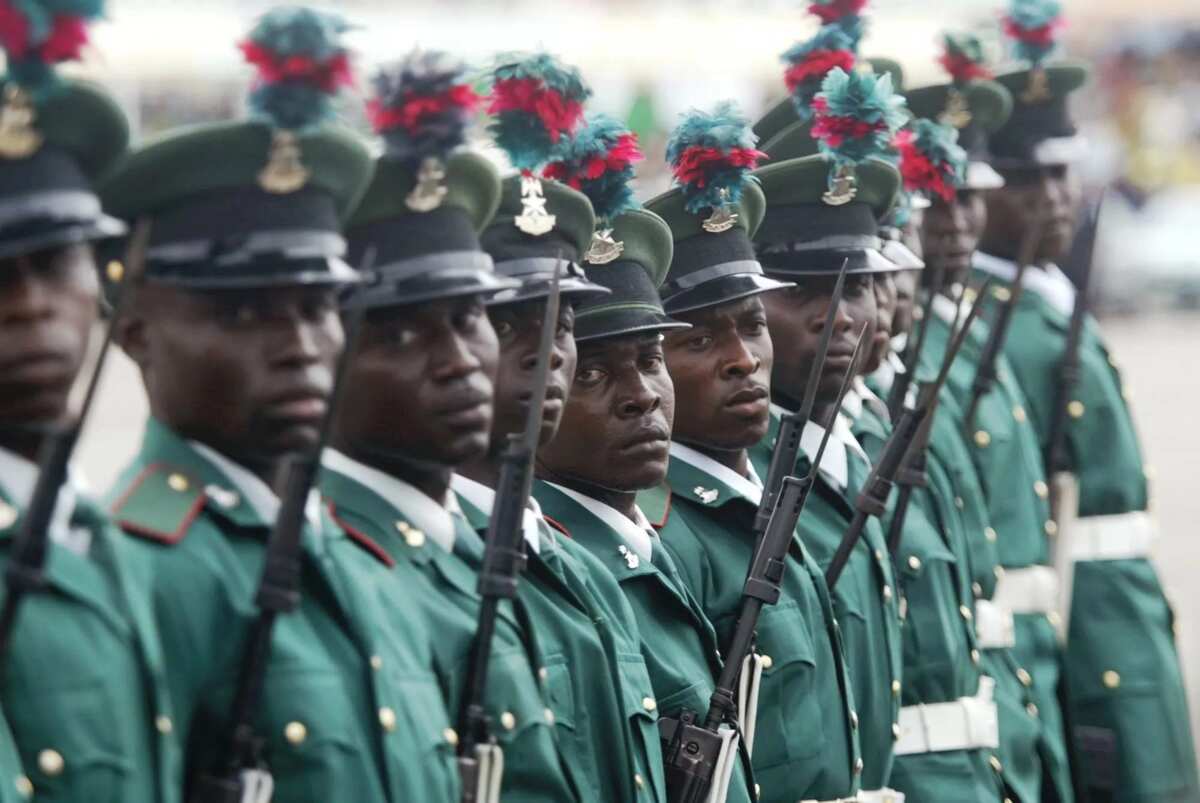
The main features of military rule are:
- The concentration of power in the hands of the military ruler.
- A significant limitation or complete absence of democratic rights and freedoms.
- Willful violation of constitutional proclamation of rights and freedoms in the pretext of restoring and maintaining order in the country.
- The military government can resort to weapons for resolving any conflict. People lose any right to express their opinion and have to suffer under the pressure of armed people.

Causes, positive and negative effects of military rule in Nigeria
However, military rule has positive sights:
- The rulers have no other choice but maintain and sponsor some projects, the civilian government forgets about in peaceful times.
- The military rule includes severe discipline, that factually “destroys” corruption and bureaucracy.
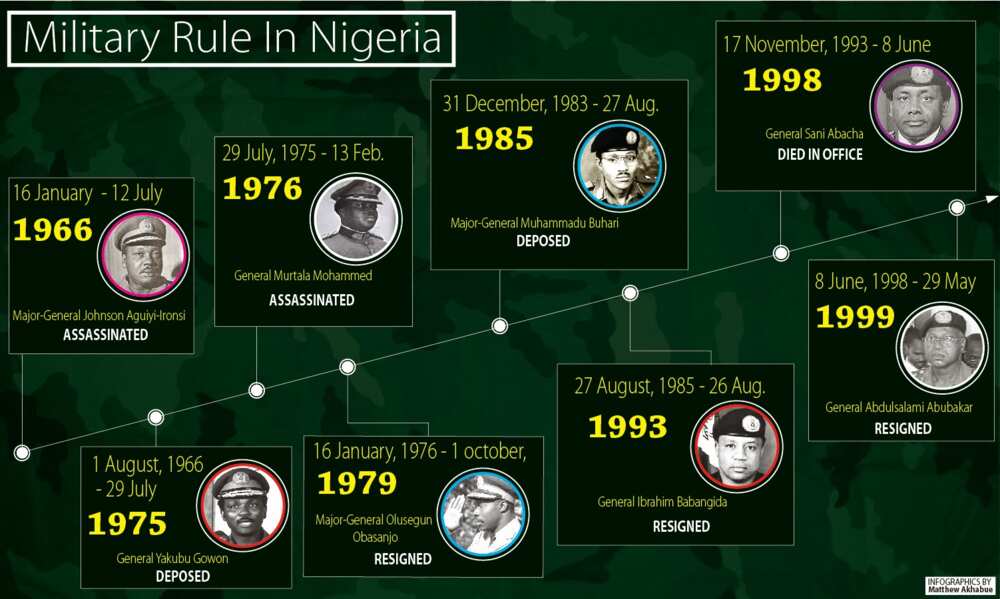
READ ALSO: History of Democracy Day in Nigeria
What are the advantages of democracy over military rule in relation to human rights
We are going to speak about democracy and the army rule in the context of Nigeria because this country experienced both regimes.
Military rule in Nigeria started for the first time in 1966 – a several years after obtaining the independence. The matter was that Nigeria was in an infantile state, and it was necessary to adjust the governing so that all citizens were satisfied.
There were several coup d’états against the existing government of the grounds of ethnicity, discontentment and many other reasons. It is quite clear that military rule was not the best period in the life of Nigerian people. But citizens of the current time must be able to compare these two forms of ruling to avoid choosing the wrong ways in the future.
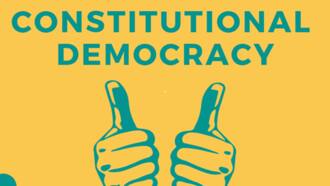
Top primary values and principles of constitutional democracy
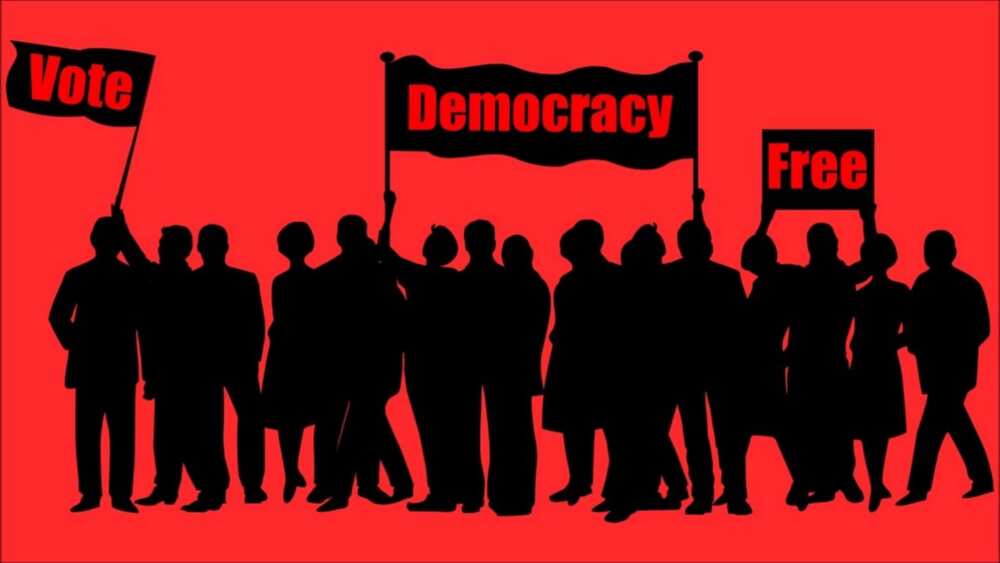
First of all, it is necessary to highlight the advantages of democracy over military rule in Nigeria concerning human rights.
1. The right to vote
The military rule usually begins with the armed seizure of the governing power.
2. The right to express one’s point of view
Military rule press is characterized by propaganda. All mass media (including radio, television, Internet) work for the government only. People can not organize demonstrations and meetings because they will be punished. During the military rule, many people were tortured because of their opposition to the government. Democracy predisposes the freedom of speech and pluralism of opinions. Meetings organized by people will be taken into account, and people will be listened to because the government depends on people.
3. The right to live
In the period of the military rule in Nigeria, many people were killed and tortured. They were not protected by the law or police. In the democratic conditions, all citizens are supposed to be protected by the law, and all people are supposed to be equal in the court.

How to solve the problem of cultural diversity in Nigeria
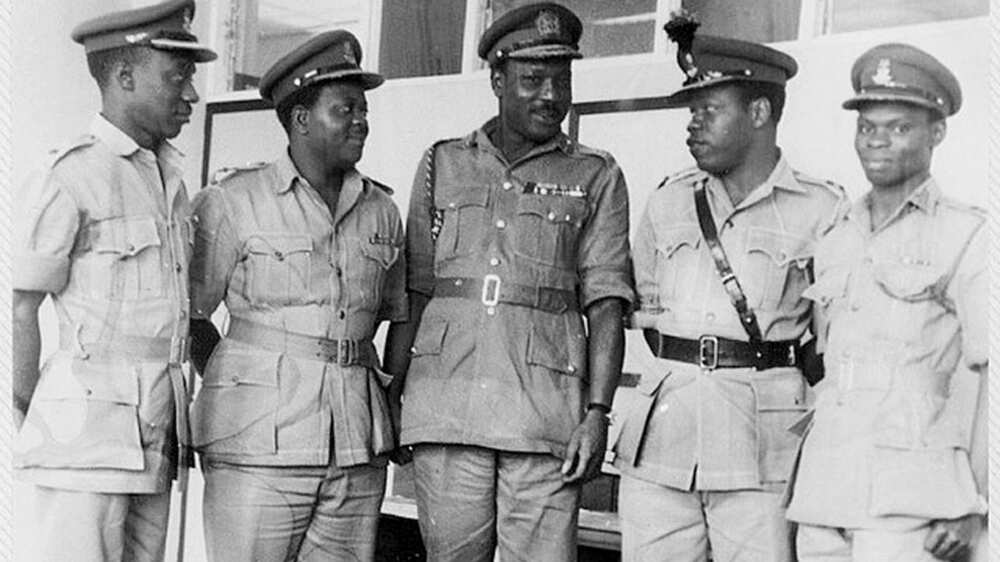
READ ALSO: History of democracy in Nigeria from 1960
Advantages of democracy over military rule in general
Other advantages of democracy over military rule in Nigeria include:
- Democracy is the best way to implement the social and political system in a society with constantly changing living conditions without revolutionary explosions and upheavals.
- Democracy is stable. People appreciate peace that is why the regime that presupposes no peace provokes mass dissatisfaction. The problem of Nigerian military rule consists in its durability. It took thirty-three years for the state to become democratic! That is why it is still so difficult to recover from the consequences of revolutions, blood spilling, and instability.
- Democracy promotes the idea of national identity, of national pride, while military rule destroys it. Many people tend to leave the country with military rule.
- Government is stable in a democratic state. Unlike the military rule, you will never wake up and hear the name of a new ruler of the country. Democracy brings stability. At least, in the democratic state, you will go to bed thinking that tomorrow will be a different day!

Advantages and disadvantages of democracy
As it can be seen, military rule is evil, like any other authoritarian rule. This is not just someone’s subjective point of view. Summing up the advantages of democratic rule over military rule is human life which is the most precious thing in the world and any rule that threats or neglects it is considered wrong, dangerous, and must be demolished. Fortunately, it happened in Nigeria, and under no conditions should it (military rule) be repeated.
READ ALSO: Advantages and disadvantages of democracy
Source: Legit.ng
- Work & Careers
- Life & Arts
Become an FT subscriber
Limited time offer save up to 40% on standard digital.
- Global news & analysis
- Expert opinion
- Special features
- FirstFT newsletter
- Videos & Podcasts
- Android & iOS app
- FT Edit app
- 10 gift articles per month
Explore more offers.
Standard digital.
- FT Digital Edition
Premium Digital
Print + premium digital.
Then $75 per month. Complete digital access to quality FT journalism on any device. Cancel anytime during your trial.
- 10 additional gift articles per month
- Global news & analysis
- Exclusive FT analysis
- Videos & Podcasts
- FT App on Android & iOS
- Everything in Standard Digital
- Premium newsletters
- Weekday Print Edition
Complete digital access to quality FT journalism with expert analysis from industry leaders. Pay a year upfront and save 20%.
- Everything in Print
- Everything in Premium Digital
The new FT Digital Edition: today’s FT, cover to cover on any device. This subscription does not include access to ft.com or the FT App.
Terms & Conditions apply
Explore our full range of subscriptions.
Why the ft.
See why over a million readers pay to read the Financial Times.
International Edition
How does this work

Customer Reviews
How do I place an order with your paper writing service?

IMAGES
VIDEO
COMMENTS
By August 2, 2023. The debate between democracy and military rule has long been a topic of contention in discussions about governance. In this essay, we will explore the advantages of democracy over military rule, focusing on representation, human rights, the rule of law, economic development, and peaceful transitions of power.
Among Mexicans who believe the next generation will be worse off, only 52% say representative democracy is good for the country. Backing for government by elected representatives is at 72% among those who say children will be better off than their parents. Attitudes toward representative democracy are also associated with opinions about diversity.
Explanation: Military rule is not better than democratic rule. It's just different. The military rule works better than democracy during emergencies and life-or-death situations. A soldier can't afford to sit around taking a vote when the enemy is shooting. Likewise, democracy works best during peace because civil society is fairer when not ...
Explore the debate on whether civilian rule is better than military rule. This article provides insights into the advantages of civilian governance, backed by expert opinions and historical examples. ... write an argumentative essay on civilian rule is better than military rule. ... The country's journey toward democracy led to economic ...
Argumentative Essay: Women are better politician than men. Women are better politicians than men There is a mindset in the current society that men make better politicians than women. In fact‚ that statement is not true. Women make good politicians too‚ some are even better than men in many aspects. Women politicians make better politicians ...
Arguments for Democracy. One of the arguments is that democracy is important because it can be embraced and made deliberative. This implies that deliberation of a dialogical nature is vital to the democratic society. When democracy is made deliberate in a given society, instead of people's mere adaptation to circumstance, their preferences ...
Speaking recently in a debate on the proposed National Electoral Offences Commission, Senator Smart Adeyemi appeared to suggest that military rule was preferable to democracy, stating: Popoola ...
The opportunity given to the electorate to vote for the best candidate. In addition, civilian rulers tend to govern better than military rulers. This is simply because of the fear of reprimand by the people who elected them. The civilian rulers know clearly that should they fail to perform, re-election will be difficult.
Protection of life and properties is ensured in a military regime. Decision-making is faster in military regimes than in civilian. It instills discipline and brings about order and corporate living among people in society. Control of corruption. It is cost-effective. Since the election is not conducted, billions spent on this process are avoided.
People of democracy are more tolerant and accepting of each other's differences. This is very important for any country to be happy and prosper. Get the huge list of more than 500 Essay Topics and Ideas. India: A Democratic Country. India is known to be the largest democracy all over the world. After the rule of the British ended in 1947 ...
First of all, it is necessary to highlight the advantages of democracy over military rule in Nigeria concerning human rights. 1. The right to vote. The military rule usually begins with the armed seizure of the governing power. 2. The right to express one's point of view.
A Strong Dictatorship is Better than a Weak Democracy. This house would rather have a strong dictatorship than a weak democracy Pros of having a dictatorship include: No elections‚ imagine not having to deal with all the political rhetoric‚ you already have your leader for life. Difference in opinions is ubiquitous and inevitable‚ and ...
A 2019 paper, Democracy Does Cause Growth, by Daron Acemoglu and others, argues that "there is an economically and statistically significant positive effect of democracy on future GDP per capita ...
Answer: democracy is a system of government in which people rights are valued. military regime is a system of government which is centralised under one dictator. under a military regime the people of the nation are suppressed. whereas in a democratic form of government people have the right to choose their representative. the power rest with ...
Democracy Democracy has become a dominant form of the government‚ that using in many countries.Democracy is a government form‚ which is the citizen should have a decision to vote their leader directly for their own country or elect the leader for the other problems.Democracy can develop it‚ if the majority and the minority party or the association willing works together.
Firstly, democracy is better than military rule because it is based on the will of the people. In a democracy, power is derived from the consent of the governed, meaning that leaders are accountable to the people they serve. This accountability ensures that the government works in the interest of the people, and not just a select few.
Argumentative essay on Democracy is better than military rule ... The debate between the merits of democracy and military rule has been a long-standing one, invoking various philosophical and empirical arguments. Proponents of democracy argue that it provides a system where the public can remove leaders non-violently and participate in decision ...
"Argumentative essay on democracy is better than military rule" Essays and Research Papers. Sort By: Satisfactory Essays. Good Essays. Better Essays. Powerful Essays. ... by MAJ David Nicoll The purpose of the argumentative essay is to assess written communication skills. The challenge is to persuade the reader of the validity of the thesis ...
Write a long argumentative essay of 300 words for the motion democracy is better than military rule ... The argument that democracy is better than military rule is not new, and there are several reasons why this claim is valid. Firstly, democracy is based on the principles of equality and freedom, while military rule is based on force and ...
Argumentative essay on democracy is better than military rule. In a democracy the people choose their leaders in elections in which the candidates state their views and the people choose a leader and representative who shares their values and ideals. In a military Government, some General rules with his ideals and values and usually doesn't ...
Argumentative Essay On Democracy Is Better Than Military Rule - Charita Davis #18 in Global Rating ... Argumentative Essay On Democracy Is Better Than Military Rule, Get A Term Paper Written, Top Article Review Writing Website For Masters, Sample Of Application Letter For Working Scholarship, Semantic Web Search Engine Research Papers, Essayons ...
Democracy, as a system of governance, has long been hailed as the epitome of freedom, equality, and progress. In contrast, military rule often embodies authoritarianism, repression, and instability. This essay contends that democracy is undeniably superior to military rule due to its promotion of civil liberties, accountability, and ...